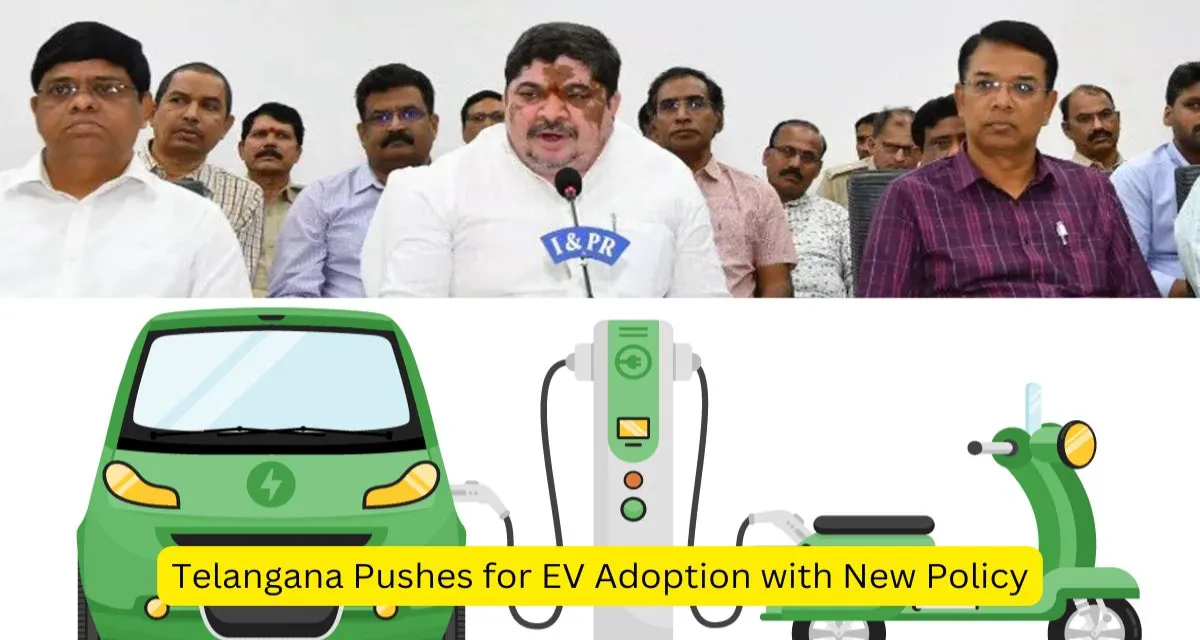

On November 17, Telangana’s government unveiled an ambitious Electric Vehicles (EV) policy aimed at reducing pollution and fostering sustainable transportation across the state. The policy, presented by Transport Minister Ponnam Prabhakar, signals a strategic effort to address the growing air pollution concerns in Hyderabad and ensure that the city and its surroundings do not face the severe pollution issues currently plaguing Delhi.
Air quality data from the Central Pollution Control Board (CPCB) highlights the urgency of the initiative. On November 18, Hyderabad’s air quality index (AQI) was recorded at 123, falling in the moderate category.
In contrast, Delhi’s AQI was a staggering 494, placing it in the severe category. This stark difference underscores the necessity of proactive measures to maintain Hyderabad’s relatively better air quality and prevent further deterioration.
The new EV policy, which came into effect on November 20, introduces a slew of benefits and incentives to promote the adoption of electric vehicles.
The government has announced a 100% exemption from road tax and registration fees for all electric vehicles for a period of two years, until December 31, 2026. Unlike previous policies that limited such exemptions to the first 5,000 EVs, the new policy removes any cap, allowing unlimited registrations under this scheme.
Two-wheelers can save up to ₹15,000 in taxes and fees.
Four-wheelers can save up to ₹3 lakh.
These exemptions apply to all types of EVs, including two-wheelers, four-wheelers, three-seater auto-rickshaws, electric tractors, commercial passenger vehicles like taxis and tourist cabs, and even electric buses.
Electric buses, especially those operated by companies or firms to transport their employees, are fully exempt from road tax and registration fees. Additionally, nearly 3,000 diesel buses currently operated by the Telangana State Road Transport Corporation (TSRTC) in the Greater Hyderabad Municipal Corporation (GHMC) area will be replaced with electric buses in phases. This move is expected to drastically cut emissions in densely populated urban areas.
Recognizing the importance of robust infrastructure, the state government plans to collaborate with EV manufacturers to establish charging stations across urban centers, towns, and along state and national highways. This initiative aims to eliminate range anxiety, one of the primary barriers to EV adoption.
In a complementary move, the government is preparing to introduce a scrappage policy for vehicles older than 15 years. This measure is expected to phase out high-pollution vehicles and encourage the shift to cleaner, electric alternatives.
The government has made a direct appeal to residents considering the purchase of new vehicles. Minister Prabhakar urged citizens to choose electric vehicles, emphasizing their environmental and economic benefits. From reduced emissions to long-term cost savings, EVs are being positioned as a win-win solution for consumers and the planet.
The policy is a cornerstone of the Congress-led government’s vision for “cleaner air in a greener state.” Hyderabad, being a rapidly growing metropolis, is at the heart of this initiative. Reducing vehicular emissions is critical to ensuring sustainable urban development and improving the quality of life for its residents.
Telangana’s policy comes at a time when urban air pollution is a pressing issue across India. Studies have shown that vehicle emissions are a significant contributor to deteriorating air quality. By incentivizing the adoption of EVs, the state is taking a decisive step toward reducing its carbon footprint and combating climate change.
Furthermore, the policy aligns with national goals for electrification of transport and complements global efforts to achieve net-zero emissions.
With its forward-thinking measures, Telangana is setting an example for other states to follow.
While the policy is comprehensive, its success hinges on effective implementation. Building adequate charging infrastructure, raising public awareness, and addressing affordability concerns for EVs are critical challenges. However, with sustained effort and collaboration between the government, private sector, and citizens, Telangana is poised to become a leader in India’s EV revolution.
Telangana’s new EV policy is more than just an environmental initiative—it’s a statement of intent for a sustainable future. By prioritizing cleaner transportation, the state is taking a proactive stance in safeguarding public health and setting the stage for long-term economic and ecological benefits. As Hyderabad and Telangana embark on this green journey, the policy represents a crucial step toward a cleaner, greener, and more sustainable India.
Also Read: